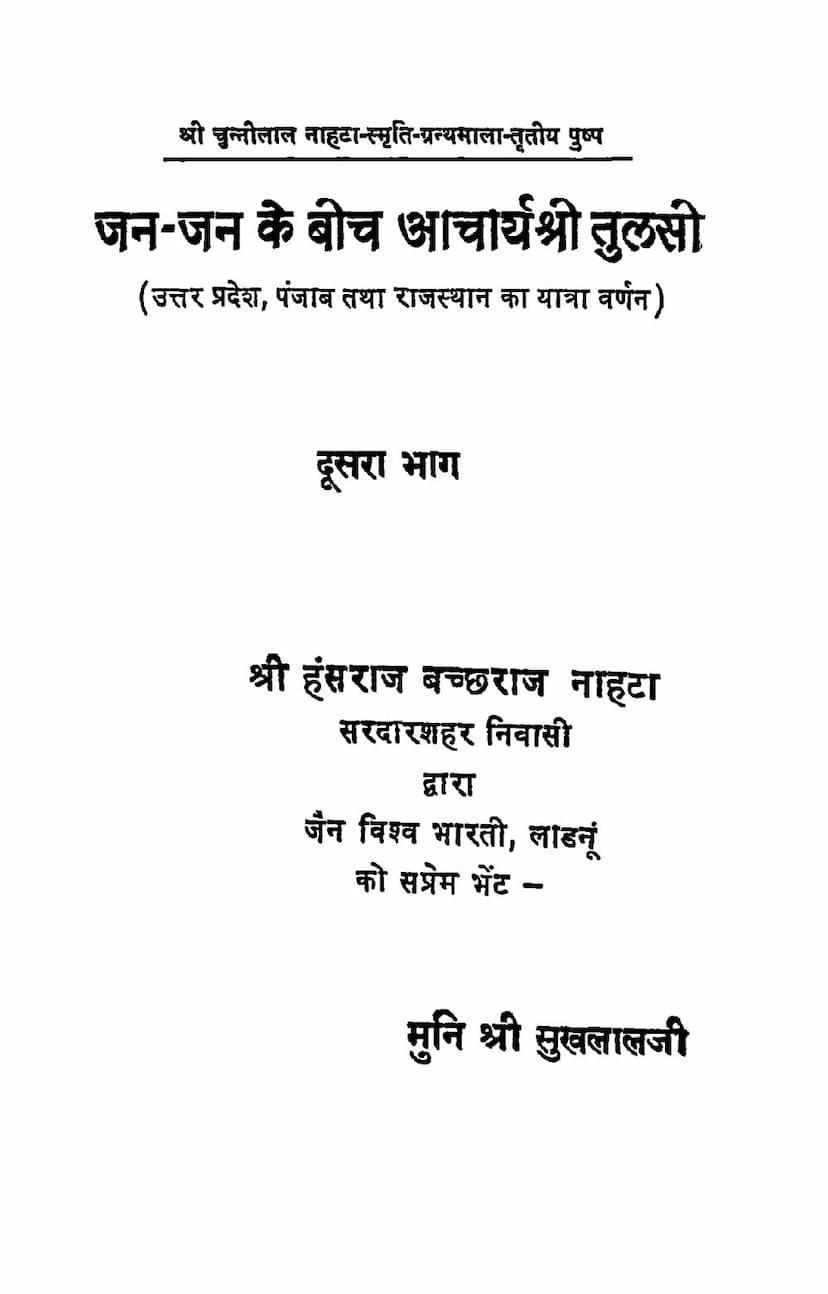Jan Jan Ke Bich Acharya Shri Tulsi Part 02
Added to library: September 2, 2025

Summary
This is a comprehensive summary of the Jain text "Jan Jan ke Bich Acharya Shri Tulsi Part 02" by Hansraj Baccharaj Nahta:
Book Title: Jan Jan ke Bich Acharya Shri Tulsi Part 02 (Acharya Shri Tulsi Among All People, Part 02) Author: Hansraj Baccharaj Nahta Publisher: Meghraj Sanchiyalal Nahta Content: The book chronicles the extensive travels and public engagements of Acharya Shri Tulsi, a prominent Jain monk, across various regions of India, primarily focusing on Uttar Pradesh, Punjab, and Rajasthan. It is the second part of a series.
Core Theme: The central theme of the book is Acharya Tulsi's active engagement with the masses. Unlike traditional monks who focus on temple rituals, Acharya Tulsi's mission was to connect with people, awakening the "sleeping God" within them. His approach emphasizes self-reliance and the power of individual devotion. The book highlights his efforts to connect people with their spiritual selves through his interactions and teachings.
Key Aspects Covered:
- Extensive Foot-Travel (Pad-Vihar): Acharya Tulsi's journey involved extensive walking, covering vast geographical areas of India. The book details his travels through Bihar, Uttar Pradesh, Punjab, and Rajasthan, starting from Calcutta in V.S. 2016.
- Focus on the People: The narrative underscores Acharya Tulsi's direct interaction with ordinary people, farmers, laborers, and villagers. It captures their simple yet profound devotion and hospitality.
- Philosophical and Ethical Teachings: The book touches upon Jain principles like non-violence (Ahimsa), the importance of ethical conduct (like the Anuvrat movement), the rejection of superstition (like the belief about the Karmnasa river), and the need for self-discipline.
- Social Commentary: Through the author's observations, the book offers insights into the social and economic conditions of the time, highlighting the differences between regions like Bihar and Uttar Pradesh, the state of education, and the prevalent superstitions.
- Personal Observations of the Author: The author, Muni Sukhlalji, provides personal reflections on Acharya Tulsi's character, his unwavering composure amidst difficulties, his dedication to duty, and his profound faith. He admits the limitations of capturing such a grand personality but asserts the accuracy of his portrayal within his capacity.
- The Anuvrat Movement: The book provides glimpses into the Anuvrat movement, its principles, and its reception among different sections of society. It shows people taking pledges against alcohol, meat consumption, and other harmful practices.
- Challenges and Resilience: The text details the challenges faced during the journey, such as bad weather, difficult terrain, and the need for accommodation. It also highlights the resilience of Acharya Tulsi and his followers in overcoming these obstacles.
- Impact on the Public: The book showcases the deep impact Acharya Tulsi had on people, inspiring them to adopt ethical practices, take vows, and seek spiritual guidance.
- Interactions with Intellectuals and Leaders: The narrative includes meetings and discussions with intellectuals, politicians, and public figures, indicating the widespread respect and influence Acharya Tulsi commanded. For instance, interactions with political leaders like Nehruji and public figures like Purushottamdas Tandon are mentioned.
- Discussions on Jain Philosophy and Agamas: The book touches upon deeper Jain philosophical concepts and the importance of studying Jain scriptures like Agamas. The author and others emphasize the need for rigorous research and understanding of these ancient texts.
- Emphasis on Simple Living and Detachment: Acharya Tulsi's own simple lifestyle, his minimal possessions, and his consistent adherence to principles even when offered comforts are repeatedly emphasized.
- The Role of Disciples and Followers: The text highlights the dedication and efforts of Acharya Tulsi's disciples and followers in managing his tours, organizing events, and assisting him.
- Specific Incidents and Anecdotes: Numerous anecdotes illustrate Acharya Tulsi's compassion, his wisdom in dealing with people, his ability to inspire, and his unwavering commitment to his vows. Examples include his interactions with villagers, his response to a dog's needs, and his handling of a dispute.
- Cultural and Social Context: The book provides a rich tapestry of the cultural and social milieu of the regions visited, reflecting the prevailing attitudes, beliefs, and practices of the time.
- The Passing of Muni Maganlalji: A significant event narrated in the book is the passing of Muni Maganlalji, a senior and respected monk. The text details the profound grief and the memorial services held for him, reflecting the deep bond within the monastic community.
- The "New Mode" (Nai Mod) Concept: The book introduces the concept of "Nai Mod," a reformist approach aimed at modernizing societal practices while retaining core Jain values, especially in the context of rural Rajasthan.
- The "Ghor Tapasvi" (Intense Ascetic): The book details the life and passing of Muni Sukhlalji, referred to as "Ghor Tapasvi," highlighting his severe austerities and the impact of his demise on Acharya Tulsi and the community.
- The Dwishatani (Bicentennial) Celebration of Acharya Bhikshu: The book culminates with the description of the bicentennial celebration of Acharya Bhikshu, the founder of Terapanth, in Sudari. This event underscores the historical legacy and the continuation of Acharya Tulsi's mission.
Overall Significance: "Jan Jan ke Bich Acharya Shri Tulsi Part 02" serves as a valuable historical and biographical document, offering a detailed account of Acharya Tulsi's transformative journey and his profound impact on society. It showcases his dedication to spiritual revival, social reform, and the propagation of Jain principles through personal example and widespread engagement. The author's insightful narrative makes the book an engaging read for those interested in Jainism, spiritual leadership, and the socio-cultural history of India.